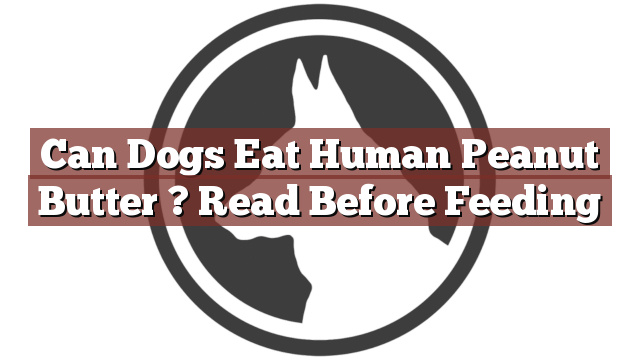Understanding Your Dog’s Dietary Needs
As a responsible dog owner, it is important to understand your furry friend’s dietary needs. Dogs have different nutritional requirements than humans, and it is crucial to provide them with a balanced and appropriate diet. While dogs are omnivores, meaning they can consume both meat and plant-based foods, not all human food is safe for them. Some foods can be toxic and cause serious health problems for dogs. It is essential to educate yourself about what is safe and healthy for your canine companion.
Can Dogs Eat Human Peanut Butter? Read Before Feeding
Can dogs eat human peanut butter? This is a common question among dog owners, and the answer is yes. Dogs can eat peanut butter, but certain precautions need to be taken. Peanut butter is a tasty and popular treat for dogs, and it is often used as a tool for training or as a way to give medication. However, it is important to note that not all peanut butter brands are safe for dogs.
Some peanut butter brands contain xylitol, a sugar substitute that is highly toxic to dogs. Xylitol can cause a sudden release of insulin, leading to a dangerous drop in blood sugar levels. This can result in symptoms such as vomiting, seizures, and even liver failure. Therefore, it is crucial to read the ingredient label carefully before feeding peanut butter to your canine companion.
Pros and Cons of Feeding Peanut Butter to Dogs
Feeding peanut butter to your dog can have both pros and cons. On the positive side, peanut butter is a good source of protein, healthy fats, and vitamins. It can be a tasty and nutritious addition to your dog’s diet. Peanut butter also contains heart-healthy fats that can contribute to a shiny coat and healthy skin for your furry friend.
However, it is important to note that peanut butter should be given in moderation. It is high in calories and fat, so excessive consumption can lead to weight gain and obesity in dogs. Additionally, some dogs may have allergies to peanuts or develop gastrointestinal issues when consuming peanut butter. Therefore, it is crucial to introduce peanut butter gradually and monitor your dog for any adverse reactions.
Conclusion: Make an Informed Decision for Your Canine Companion
In conclusion, dogs can eat human peanut butter, but it should be given with caution. Always check the ingredient label to ensure it does not contain xylitol, which can be toxic to dogs. While peanut butter can be a tasty and nutritious treat for your canine companion, it should be given in moderation to avoid weight gain and potential allergies or gastrointestinal issues. As a responsible dog owner, it is important to make an informed decision about what foods to feed your furry friend and to prioritize their health and well-being.
Thank you for taking the time to read through our exploration of [page_title]. As every dog lover knows, our furry friends have unique dietary needs and responses, often varying from one canine to another. This is why it's paramount to approach any changes in their diet with caution and knowledge.
Before introducing any new treats or making alterations to your dog's diet based on our insights, it's crucial to consult with a veterinarian about [page_title]. Their expertise ensures that the choices you make are well-suited to your particular pet's health and well-being.
Even seemingly harmless foods can sometimes lead to allergic reactions or digestive issues, which is why monitoring your dog after introducing any new food item is essential.
The content provided here on [page_title] is crafted with care, thorough research, and a genuine love for dogs. Nevertheless, it serves as a general guideline and should not be considered a substitute for professional veterinary advice.
Always prioritize the expert insights of your veterinarian, and remember that the health and happiness of your furry companion come first.
May your journey with your pet continue to be filled with joy, love, and safe culinary adventures. Happy reading, and even happier snacking for your canine friend!

